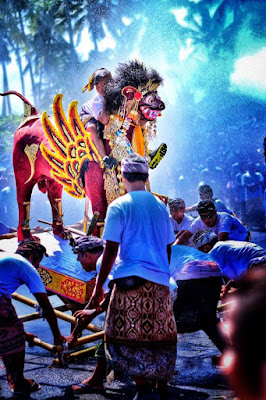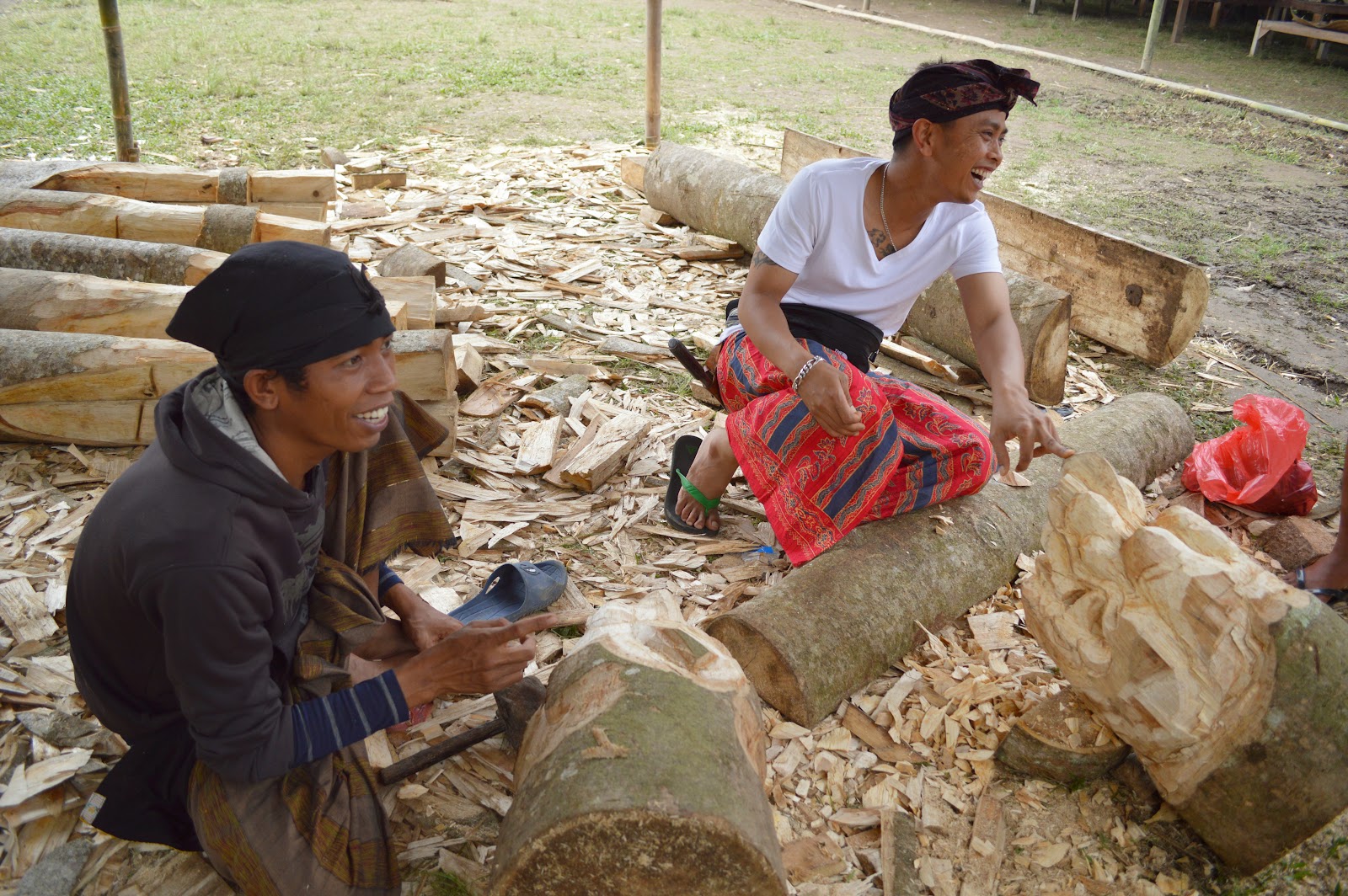Ibu Robin's secret
Fiorella Connie Carollo
The secret behind Ibu Robin’s accomplishments as a birth keeper is a very simple yet powerful one. It was embedded in her soul at a very young age, infact Robin was just 11 years old, when her Philippine grandma didn’t let her go with the U.S. Army‘s helicopter, landed on the little mountain hamlet in The Philippines where they lived, to take Robin to the military base in the plain where her American father worked, to get proper treatment from a massive kidney stone infection. Robin was totally scared to separate from her mother’s world in the mountain to fly to a place unknown to her, away from daily walks with grandma searching for herbs and swimming into mountain streams. Robin’s grandma kidnapped her from her parents, hid her in a shack and taught Robin her first life-long lesson: “Never trust the white men medicine. They’ll cook you, they’ll catch you up and they’ll kill you.” Robin’s grandma was a hilot in The Philippines, a midwife and also a herbalist, once in the shack, she fed the granddaughter with herbal teas, took the heir of the corn from her garden instructing Robin: ”Corn is woman, you boil it and it’ll heal you” and eventually healed the granddaughter. She must have been a very special woman and very dear to Robin, grandma got pregnant for the first time at 13 years old and breastfed her first child against e reluctant father who threatened her, she waited the night to come and hit the husband to kick him out.
Few decades later, as a teenager, Robin migrated with
the family to the U.S.A., her father’s home country and soon enough showed
everybody to be the worthy descendant of such a lineage of strong women in
refusing, at 16 y.o. a vaginal check to a doctor gynaecologist who was supposed
to prescribe her a birth-control pill. Here comes the second life-long lesson
taught by grandma: “Your body is your temple, never trust anyone to come inside
without your permission”. Robin believes that grandmother placed under her skin
as a child what the Philippine people call the antin-antin: “Like the grain of sand inside the oyster that grows
into a pearl, it forces you to
embrace your life-long passion. No matter what I do, I wouldn’t feel
comfortable unless I dedicate myself to building peace in the way I’m doing
now. If I have to set a beginning point in the past, for what I am now, I guess
it all started 38 years ago, I was a teenager mother, and I was poor in the
U.S.A with no insurance, living in a 6mx25m trailer-house. We were people
virtually at the end of the road in California, I rode my bicycle to school
pregnant, and instead of panicking for being poor and uninsured, I started
meeting midwives, young, inexperienced, junior midwives training with doctors
or training as nurses at hospital, and then one day I said: ‘You know what? I’m
not going to hospital because how many times did I go there and saw mothers
standing in front of the window, wearing their robe just after childbirth,
bleeding and crying, watching their babies on the other side of the glass in
plastic boxes!’ This to me seemed totally unnatural especially since my grandma
was a hilot who gave birth to ten
children at home, and everybody I knew in my village was born at home and there
wasn’t any need for hospital in our mountain village, then. In the end, my
daughter was born safely at home and the birthing was as gentle and as loving
as it can be”.
The
setup of a birth centre on Bali
As soon as Robin moved on Bali with her husband and
their six children in 1992, she got pregnant of Mike, her last son, and very
early realised that for her and other Balinese pregnant women there was very
little adequate healthcare and found themselves in very hard time. Again,
Robin’s personal story push her to taking charge: very sadly, Robin’s younger
sister Christine died of heart complication during the last weeks of her
pregnancy, due also to her doctor negligence, being her underprivileged. Since
Ubud was then a very unsafe environment for pregnant women, together with other
Balinese women Robin started a sort of facility at her home which eventually,
thanks to the involvement and support of other bodies, like The Gyaniar
Regency, led to the foundation of the birthing centre Bumi Sehat “Healthy
mother-earth”! What does it mean to give
free-midwifery-care, free-birthing, free-treatment like Bumi Sehat does on a
daily basis? In Indonesia hospitals charge you for any treatments from a stich
on your head to give birth and it does come with a high bill, delivering is as
much as 1.300 US$, the Balinese average wage for a woman is less than 130 US$ a
month, a large part of the population is left without healthcare, to these
people Bumi Sehat offers her help. Even though Ubud and surroundings have
become rather wealthy thanks to mass-tourism, still there are underprivileged
people or discriminated people like HIV positive. It has been a year since at
the Clinic has been open a lab where you can have a confidential HIV test and
counselling. Tika is the young woman in charge of the lab and the counselling
and she looks very proud of her job that requires educating patients to the
real risk and development of the disease. She told me that they deal on average
with hundred people a month, pregnant
women and others. Single mothers too are really underprivileged in this part of
the world and they become easy prey of pimps who hire and offer them a house
together with other single mothers, where they can support each other in taking
care of their children otherwise left unattended. The pimps provide them with
food, a steady income, a home and all that can sound very attractive for women
who have no support at all, even though the chance to become HIV positive is
very real for them and their baby. Robin
told me that when run away pregnant women knock at the clinic door because the
family turned abusive once they have found out their pregnancy, the clinic gets
soon into action in giving them shelter, assistance and a job to prevent pimps
to be the girl only option to survive: “Few days ago a girl showed up at my
kitchen coming as far as Java and since her village is run by sharia law her
father was going to stoned her because she was raped! She took a bus with no
money in her pocket and arrived here”. Robin feels very sensitive about the
problem of single mothers without support because she was herself a single
mother for many years struggling to make ends meet in the States. Ibu Robin
sounds very, very proud about Bumi Sehat achievements: “I don’t know many other
places in the world where you can have a community healthcare for free, the
protection of human rights, a place that does midwifery to mother care, that
does recycling in the village-and because we started that 20 years ago we’ve
been named “The cleanest village in Indonesia” mind, not just Bali, but
Indonesia the fourth largest country in the world, and we’ve achieved that
because we were able to motivate the whole village. No wonder people give us
donation!
Women’s
and children rights are human rights
Robin is very committed to the belief that we can
build peace; we can make the world a sustainable place if we protect the rights
of our youngest citizens: “Researches say that all our capacity to love and
trust is set at birth. Is not the first 18 months as they used to say, we now
know that is the very first hour of life, is the actual birth and is about how
the mother has been treated in pregnancy, how she’s been fed and nourished,
because also love is a nutrient, also support is a nutrient, trust and safety
are nutrients. Those are the elements that make people become the next peace
builder or not”. She is very much involved in advocating Children Human Rights
and the cause she's campaigning for now, is delaying the clamping and cutting of the
umbilical cord thus allowing the intake of cord-blood- that sums up to
one-third of the total blood- in new-born babies:” At Bumi Sehat we have received nearly 7,000 babies safely
into the world, in high-risk, low resource settings. ALL of them enjoyed
delayed umbilical cord clamping and cutting. Normally we wait 3 hours before
doing anything with the babies’ umbilical cords. Our MotherBabies enjoy a breastfeeding rate of 100% upon discharge from
all of our three childbirth centres, in Indonesia and the Philippines. We
attribute the success of mothers to breastfeed to the bright, enthusiastic way
in which babies, born at our birth centres, bond wide-eyed, and go directly to
the breast to self-attach and feed. Babies who are compromised by new-born
anaemia, caused by the immediate or early clamping and cutting of their
umbilical cords, are withered in comparison, and have more difficulty finding
the energy required to self-attach and robustly feed at mother’s breasts”.
The
teak house
Her biggest dream now is to find some land in donation where to lay a teak
house that somebody has recently donated to Bumi Sehat from Thailand. It's going to be a very big thing: a women’s shelter for single
mothers with no support or women fleeing an abusive spouse, but also a research
centre collecting data from all over the world about pregnancy and birthing. Ibu Robin is thinking to the research carried on in Italy under the leadership of
gynaecologist Niccolò Giovannini with questionnaires of 7000 women; the research will be the first step in order to promote the
model of gentle birth in the world. “The teak house will be also a place where women can
share their knowledge like is happening during our workshops “Loving the
mother” with Giuditta Tornetta and many other women involved in the art of natural birthing".




Commenti
Posta un commento